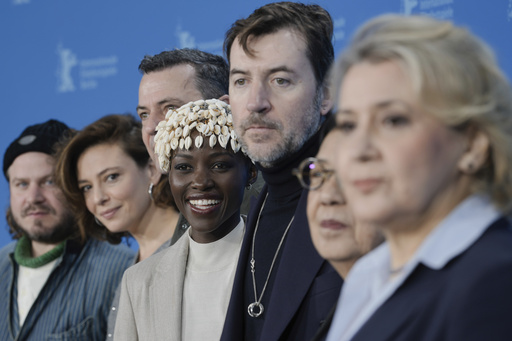BERLIN (AP) — The head of the jury at the 74th Berlin International Film Festival pushed back on political questions as the festival kicked off on Thursday, seeking instead to shift the focus to the tough selection ahead for the best movie.
Twenty titles from around the globe will compete for the top prize, the Golden Bear, with Thursday ‘s opening marking the world premiere of “Small Things Like These,” starring man of the moment Cillian Murphy.
“It’s going to be interesting,” said jury president and Oscar-winning actor Lupita Nyong’o when asked about differing views of this year’s panel of actors, directors and writers tasked with choosing the winner.
“It’s probably also going to be spicy,” the Kenyan-Mexican actor added with a smile, speaking at a news conference in the German capital. “The beauty of bringing people together from different backgrounds is that we respond to different things. … We are having robust conversations.”
Nyong’o is the Berlinale’s first Black jury president and said she felt greatly honored to lead this year’s jury.
“This is a chance for me to learn a lot about the world of cinema and to celebrate it,” she said and added that she plans to “listen first.”
Still, as reporters hurled questions about the Israel-Hamas war in Gaza, Ukraine and German politics, Nyong’o and the other jurors mostly dodged them.
One question she could not avoid was about the far-right Alternative for Germany party, or AfD, which the organizers last week uninvited to the opening gala. Five AfD politicians had been expected to attend since members of all parties in Berlin’s state legislature are invited to events supported with public money.
In recent weeks, Germany has seen large protests against the far right, following a report that extremists met to discuss deporting millions of immigrants, including some with German citizenship, and that some members of AfD were present.
“I’m a foreigner here,” Nyong’o said before continuing, “I don’t know the ins and outs of the political situation here, so I’m glad I don’t have to answer that question.”
However, other jury members were more vocal on the subject.
German director Christian Petzold appeared critical about the decision to uninvite the AfD politicians. “If we can’t stand five persons of the AfD in the part of the audience, we will lose our fight.”
“Imagine having five fascists sitting in the room, watching the cinema that Berlinale chose to tell for this reality, for this moment,” said Italian actor Jasmine Trinca, suggesting this might broaden the politicians’ horizons.
Later, when asked to elaborate, Petzold said that the fact that “hundreds, thousands of people (are) demonstrating against” AfD is “much more important than these kind of discussions.”
Among the competition entries this year is French-Senegalese director Mati Diop with her documentary “Dahomey,” exploring colonization through the return of stolen artifacts plundered by French colonial troops and returned to Benin in West Africa.
“Black Tea” from Mauritian-born Malian director Abderrahmane Sissako also focuses on the African diaspora, the story of a young Ivorian woman who emigrates to China and falls in love with an older Chinese man.
Nyong’o said she was happy Africa is featuring at the festival but added that she is “always hungry for more.”
Along with Trinca and Petzold, this year’s jury in Berlin also includes actor-directors Brady Corbet, directors Ann Hui and Albert Serra, as well as Ukrainian writer Oksana Zabuzhko. The festival runs through Feb. 25.
This website uses cookies so that we can provide you with the best user experience possible. Cookie information is stored in your browser and performs functions such as recognising you when you return to our website and helping our team to understand which sections of the website you find most interesting and useful.
